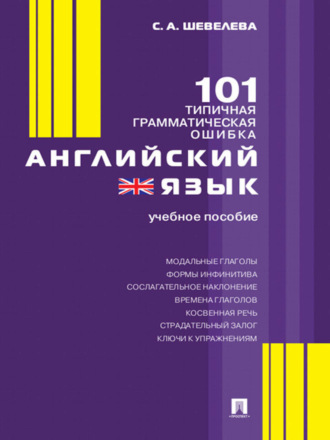
Полная версия
Английский язык. 101 типичная грамматическая ошибка
3) others другие
без существительного
I have got this album and a few others.
4) the other другой, второй
+ существительное в ед. числе
I have got two books of this author. I've read this one.
And now I'm reading the other.
5) the others другие, остальные
без существительного
Here are ten books of this author. I've read this one.
But I haven't read the others.
26-1. Use the right word (another or other), and translate the sentences.
1. He has bought… car this year.
2. Could I have… cup of coffee?
3. Will you have… cup of tea?
4. I won't say… word about it.
5. I think we should paint the wall… colour.
6. Those cakes are wonderful. Could I have… one?
7. Have you got any… cakes, or are these the only ones?
26-2. Use the right word (other or others), and translate the sentences.
1. These shoes are too small. Have you got any…?
2. Why don't you think more about… people?
3. He never thinks of…
4. I don't like these gloves. Have you any…?
5. Please let me see some…
6. Jim is far better as a player than any… member of the team.
7. He has been to France, Italy, Greece and many… countries.
26-3. Use the right word (the other or the others), and translate the sentences.
1. Here are three photos only. Where are…?
2. I've got one lot of photos. Where are…?
3. John has arrived. I must tell… They were eager to see him.
4. One of these two bags is mine… is my sister's.
5. The post office is on… side of the street.
6. Six of these pens are mine… are John's.
7. The twins are so much alike that people find it difficult to tell one from.
26-4. Translate into English.
1. На конференции были представители Англии, Франции и других европейских стран.
2. Англия и Германия поддержали это предложение, остальные – нет.
3. Вот два термина. Один я знаю, а другой вижу первый раз.
4. Я пригласил Ирину и несколько других друзей.
5. Можно ещё чашечку кофе?
27. Some – any – no
Эти местоимения употребляются в следующих типах предложений:
some
1) в утвердительных предложениях:
I bought some cheese. Я купил (немного) сыра.
2) в вопросительных предложениях, выражающих просьбу или вежливое предложение:
May I have some cheese? Можно (немного) сыра?
Would you like some cheese? Не хотите (немного) сыра?
any
1) в вопросительных предложениях:
Did you buy any cheese? Вы купили (какого-нибудь) сыра?
2) в отрицательных предложениях, если сказуемое употребляется в отрицательной форме:
I didn't buy any cheese. Я не купил (никакого) сыра.
3) в утвердительных предложениях, в значении любой:
I like any cheese. Я люблю любой сыр.
no
в отрицательных предложениях, при этом сказуемое употребляется в утвердительной форме:
I bought no cheese. Я не купил (никакого) сыра.
27-1. Read and translate the sentences.
1. We got talking to some students.
2. You've got some great books.
3. Do you mind if I put some music on?
4. I've got too many strawberries. Would you like some?
5. Have you got any razor blades? Sorry, I haven't got any.
6. She does not have any problems now.
7. Did you meet any interesting people on holiday?
8. I've got no Thursdays free this term.
9. I telephoned, but there was no answer.
10. The train was cancelled, so I had no alternative but to take a taxi.
27-2. Use the right word (some or any), and translate the sentences.
1…. people like the sea. Others prefer the mountains.
2. I've got tickets for… concerts next month.
3. She hasn't got… manners.
4. We have planted… roses in the garden.
5. I've just bought… books on computing.
6. Would you like… more rice?
7. He needs… help.
27-3. Use the right word (any or no), and translate the sentences.
1. He's got… children.
2. Sorry I can't stop. I've got… time.
3. I didn't buy… eggs.
4. Is there… milk left in the jar?
5. There were… letters for me that morning.
6. Is there… water in the fridge?
7. There was… wardrobe in the bedroom.
26-4. Translate into English.
1. Некоторые (люди) любят отпуск зимой.
2. Не хотите еще овощей?
3. Ему не нужна никакая помощь.
4. У них нет никаких вопросов.
5. У вас есть какие-нибудь вопросы?
28. Somebody – anybody – nobody
Эти местоимения употребляются в следующих типах предложений:
somebody
в утвердительных предложениях:
I saw somebody in the garden.
anybody
1) в вопросительных предложениях:
Did you see anybody in the garden?
2) в отрицательных предложениях, если сказуемое употребляется в отрицательной форме:
I didn't see anybody in the house.
3) в утвердительных предложениях, в значении любой:
Anybody can do this job.
nobody
в отрицательных предложениях, при этом сказуемое употребляется в утвердительной форме:
Nobody could help me.
28-1. Read and translate the sentences.
1. It was clear that somebody would have to leave earlier.
2. Nobody could answer this question.
3. Nobody objected to his being invited.
4. Anybody could cope with the task.
5. Nobody would take his words on trust.
6. Somebody has played a practical joke on him.
7. Did anybody telephone?
8. There's somebody outside who wants to speak to you.
9. She writes better than anybody I know.
10. He said he would marry her or nobody.
28-2. Translate into English.
1. Вас кто-то спрашивает.
2. Мне кто-нибудь звонил?
3. Никто не хотел этого делать.
4. Любой может справиться с этой задачей.
5. Никто не знает её адреса.
29. Something – anything – nothing
Эти местоимения употребляются в следующих типах предложений:
something
1) в утвердительных предложениях:
She said something in Chinese.
2) в вопросительных предложениях, выражающих просьбу или вежливое предложение:
Can I get you something to drink?
anything
1) в вопросительных предложениях:
Did she say anything?
2) в отрицательных предложениях, если сказуемое употребляется в отрицательной форме:
I didn't say anything.
nothing
в отрицательных предложениях, при этом сказуемое употребляется в утвердительной форме:
She said nothing in reply.
29-1. Read and translate the sentences.
1. We didn't do anything much yesterday.
2. He eats nothing but hamburgers.
3. Would you like anything else?
4. I feel like eating something hot.
5. There's nothing much on TV tonight.
6. Nothing can be done.
7. Have you read anything interesting lately?
8. There's nothing for the cats to eat.
9. Have you got something for me to do?
10. Have you got anything that belongs to her?
29-2. Translate into English.
1. Вы знаете что-нибудь об этом?
2. Я ничего не слышал о её приезде.
3. Он рассказывает что-то интересное.
4. В этом нет ничего интересного.
5. Он что-нибудь сказал вам?
30. This – these, that – those
Эти местоимения употребляются в зависимости от того, в каком числе стоит последующее существительное:
this этот
+ существительное в единственном числе:
Do you like this ring?
these эти
+ существительное во множественном числе:
Do you like these rings?
that (вон) тот
+ существительное в единственном числе
Do you like that ring?
those (вон) те
+ существительное во множественном числе:
Do you like those rings?
30-1. Use the right word (this or these), and translate the sentences.
1. I like… music. What is it?
2. Now tell me about… new boyfriend of yours.
3.. new shoes of mine are painfully tight.
4. The meeting is… Thursday.
5. I haven't seen Jane… week.
6. Are… books yours?
7. I hope I shall see Mary… week.
8. Paul has been walking in Scotland all… month.
9. Life is difficult… days.
10. They all ended up at… pub.
30-2. Use the right word (that or those), and translate the sentences.
1. I can't stand… perfume of hers.
2. I'll never forget meeting you… afternoon.
3. Look at… men there!
4. What was… noise?
5. This book is much better than… one.
6. Life was much easier in… days.
7. When does he intend to repay… sum of five pounds?
8…. were the days, my friend.
9…. news is very important.
10. When did he get… information?
30-3. Translate into English.
1) эта музыка
2) эти звуки
3) этот композитор
4) эти награды
5) этот день
6) тот год
7) те люди
8) та сумма
9) те сведения
10) те новости
ПРИЛАГАТЕЛЬНЫЕ
31. Степени сравнения
Прилагательные, состоящие из одного или двух слогов, образуют степени сравнения с помощью суффиксов – er, – est.
Конец ознакомительного фрагмента.
Текст предоставлен ООО «ЛитРес».
Прочитайте эту книгу целиком, купив полную легальную версию на ЛитРес.
Безопасно оплатить книгу можно банковской картой Visa, MasterCard, Maestro, со счета мобильного телефона, с платежного терминала, в салоне МТС или Связной, через PayPal, WebMoney, Яндекс.Деньги, QIWI Кошелек, бонусными картами или другим удобным Вам способом.









